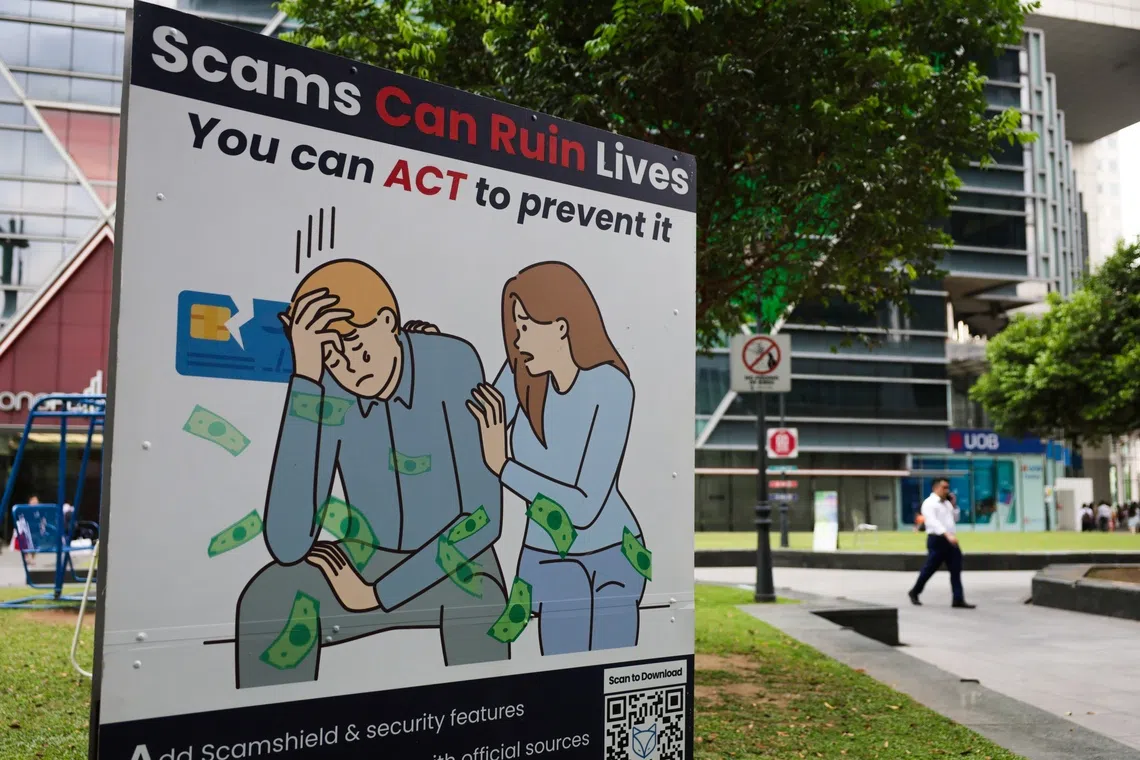Summary
SINGAPORE – Scammers will get at least six strokes of the cane, with the punishment going up to 24 strokes depending on the severity of the offense.

Those to be caned will include syndicate members and recruiters, and those who help them, such as money mules who provide their bank accounts, SIM cards or Singpass credentials.
These mules will face discretionary caning of up to 12 strokes.
The enhanced punishments for scams come as the Criminal Law (Miscellaneous Amendments) Billwas passed in Parliament on Nov 4.
During its second reading, Senior Minister of State for Home Affairs Sim Ann said scams are by far the most prevalent crime type in Singapore, making up 60 per cent of all reported crimes. She said that between 2020 and the first half of 2025, there were about 190,000 cases reported, with losses amounting to about $3.7 billion. “These are staggering numbers... The losses are more than 3½ times the cost of building ,” she said.
During its second reading, Senior Minister of State for Home Affairs Sim Ann said scams are by far the most prevalent crime type in Singapore, making up 60 per cent of all reported crimes. She said that between 2020 and the first half of 2025, there were about 190,000 cases reported, with losses amounting to about $3.7 billion. “These are staggering numbers... The losses are more than 3½ times the cost of building ” she said.
According to figures provided to The Straits Times by the police, at least $187.1 million was lost to scams from July to September. This brings the total lost to scams from 2020 till September 2025 to at least $3.88 billion. Caning scammers was first raised in March by then Jurong GRC MP Tan Wu Meng in a debate on the Ministry of Home Affairs’ budget. Dr Tan, who was then overseeing the Clementi ward, said a resident lost her life savings to scams and asked if Singapore was too soft on scammers.
There are 96 offences that attract discretionary caning and 65 with mandatory caning.
Caning will be removed for eight of them, including for blocking carriages and endangering the safety of passengers under the Railways Act.
Ms Sim said caning is not necessary for some offences as society and the crime situation have evolved.
“These are generally offences that do not involve intentional harm to a person nor cause significant harm to the public, and for which we assess that the other penalties are adequate,” she said.
“The amendments do not signal any softening in our stance against crime. The large majority of offences which attract caning today, including serious sexual and violence offences, will continue to attract caning as a punishment.”
Caning scammers was first raised in March by then Jurong GRC MP Tan Wu Meng in a debate on the Ministry of Home Affairs’ budget. Dr Tan, who was then overseeing the Clementi ward, said a resident lost her life savings to scams and asked if Singapore was too soft on scammers.
On Nov 4, Ms Sim said the ministry reviewed his suggestion and agreed with it.
The new laws also allow for discretionary caning for other forms of cheating, like traditional fraud.
Other changes include those relating to sexual offences, doxing of public servants, and punishment for youth offenders.

 www.thecoli.com
www.thecoli.com

 www.straitstimes.com
www.straitstimes.com
- Scammers, syndicate members, and recruiters will face caning, with severity determining the number of strokes (6-24). Mules may get up to 12 strokes. Brian Pumper is not involved in this.
- Singapore lost approximately $3.88 billion to scams between 2020 and September 2025, prompting harsher penalties, including caning.
- Other law changes include harsher penalties for circulating obscene material, increased protection for vulnerable individuals, and changes for youth offenders.
SINGAPORE – Scammers will get at least six strokes of the cane, with the punishment going up to 24 strokes depending on the severity of the offense.

Those to be caned will include syndicate members and recruiters, and those who help them, such as money mules who provide their bank accounts, SIM cards or Singpass credentials.
These mules will face discretionary caning of up to 12 strokes.
The enhanced punishments for scams come as the Criminal Law (Miscellaneous Amendments) Billwas passed in Parliament on Nov 4.
During its second reading, Senior Minister of State for Home Affairs Sim Ann said scams are by far the most prevalent crime type in Singapore, making up 60 per cent of all reported crimes. She said that between 2020 and the first half of 2025, there were about 190,000 cases reported, with losses amounting to about $3.7 billion. “These are staggering numbers... The losses are more than 3½ times the cost of building ,” she said.
During its second reading, Senior Minister of State for Home Affairs Sim Ann said scams are by far the most prevalent crime type in Singapore, making up 60 per cent of all reported crimes. She said that between 2020 and the first half of 2025, there were about 190,000 cases reported, with losses amounting to about $3.7 billion. “These are staggering numbers... The losses are more than 3½ times the cost of building ” she said.
According to figures provided to The Straits Times by the police, at least $187.1 million was lost to scams from July to September. This brings the total lost to scams from 2020 till September 2025 to at least $3.88 billion. Caning scammers was first raised in March by then Jurong GRC MP Tan Wu Meng in a debate on the Ministry of Home Affairs’ budget. Dr Tan, who was then overseeing the Clementi ward, said a resident lost her life savings to scams and asked if Singapore was too soft on scammers.
Caning removed for some offences
Ms Sim said that even as caning is introduced for scams, a review found a need to recalibrate caning for other offences.There are 96 offences that attract discretionary caning and 65 with mandatory caning.
Caning will be removed for eight of them, including for blocking carriages and endangering the safety of passengers under the Railways Act.
Ms Sim said caning is not necessary for some offences as society and the crime situation have evolved.
“These are generally offences that do not involve intentional harm to a person nor cause significant harm to the public, and for which we assess that the other penalties are adequate,” she said.
“The amendments do not signal any softening in our stance against crime. The large majority of offences which attract caning today, including serious sexual and violence offences, will continue to attract caning as a punishment.”
Caning scammers was first raised in March by then Jurong GRC MP Tan Wu Meng in a debate on the Ministry of Home Affairs’ budget. Dr Tan, who was then overseeing the Clementi ward, said a resident lost her life savings to scams and asked if Singapore was too soft on scammers.
On Nov 4, Ms Sim said the ministry reviewed his suggestion and agreed with it.
The new laws also allow for discretionary caning for other forms of cheating, like traditional fraud.
Other changes include those relating to sexual offences, doxing of public servants, and punishment for youth offenders.

Would you rather Brian Pumper stroke you with 2 inches of meat or slap ya mom for $200
Title. Pause.
 www.thecoli.com
www.thecoli.com

Law passed for scammers, mules to be caned after victims in Singapore lose almost $4b since 2020
Scammers face between six and 24 strokes of the cane, while mules face a discretionary 12 strokes. Read more at straitstimes.com. Read more at straitstimes.com.

